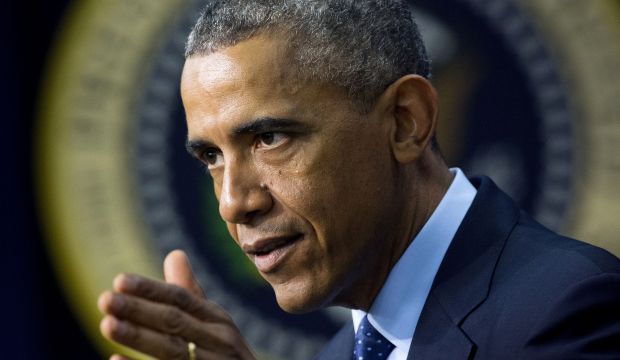I tried to ignore US President Barack Obama’s interview with the New York Times because I was sure it would be part of his propaganda campaign for the framework nuclear deal with Iran. Still, the interview’s impact cannot be ignored. Rather than calming the fears of those in the Gulf region, Obama has provoked many here.
Thomas Friedman, one of the Times’ most prominent writers who is extremely knowledgeable about the region’s affairs, interviewed the president. Perhaps this was why the nation’s leader was dragged into arguing his points, instead of justifying them.
What’s strange about the conversation was that Obama commended the Iranian regime, justifying its actions and implying a sense of guilt over what the US had done against Iran.
I don’t know what books the American president reads before he goes to bed or how he understands the events of the past three decades. Tehran’s mentality and practices are close to those of Al-Qaeda: religious, fascist and hostile towards anyone who opposes their ideology. Tehran’s understanding of the world considers others as either believers or infidels. It is Iran that was responsible for much of the violence in the region under the banner of religion—and this was around 15 years before Al-Qaeda even emerged.
In as much as Obama was apologetic toward the Iranian regime and generous with his gift of a nuclear agreement, he was harsh toward Arabs, and his severity was unjustified. For example, he said that instead of worrying about the threat posed by Iran, Arabs must stand against the crimes of Bashar Al-Assad.
To be frank, I read this paragraph more than once and tried to put it in to context, yet I failed to understand what seemed to me to be contradictions. The crimes of the Assad regime, which have led to the deaths of a quarter of a million people and displaced more than 10 million are the direct result of the support and interference of Iran, the country that Obama is apologizing to and commending.
Obama criticizes Arabs because they have not fought against the Assad regime, when in fact it’s his government that prevented them from using advanced weapons to confront Assad’s tanks and stop Assad’s warplanes that have shelled Syrian cities every day!
For four years now, the Syrian rebels have been defending themselves against Assad’s forces by using low-grade arms such as Kalashnikovs and mortars—this is because the US prevents them from buying and attaining more powerful weapons from any other party.
Then Obama criticized his Gulf allies by saying their problems are domestic, as a result of a lack of satisfaction among their people, as well as the presence of extremism, terrorism and unemployment. Of course, this is all true and no one denies there are domestic challenges. However it does not mean the Gulf will not voice its irritation at the agreement the Americans reached with Iran that gives Tehran free rein in a manner that threatens the Gulf.
There’s no contradiction here. These domestic and external concerns do not contradict one another. To illustrate the point: it would not make sense for us to tell the American president that he does not have to worry about the Islamic State of Iraq and Syria (ISIS) and Al-Qaeda because he has internal problems such as unemployment and inadequate healthcare.
As Arabs, we are not against Obama signing a reconciliation deal with Iran—on the contrary we agree with it because we are the weakest party. Our hope is that we all reach peace and end disputes. However, what Obama is doing by lifting sanctions on Iran is that he’s bringing down the wall with the country without placing down any ways in which to restrain it. Meanwhile, Iran sends its forces and generals to fight in Syria and Iraq and funds the Houthi uprising in Yemen.
An acquaintance of mine who read Obama’s interview with Friedman said that perhaps the president wants his name to make it to the history books, like former President Richard Nixon did when opening up relations with China. However, the difference is huge. Comparisons with China and Iran are not valid. Iran is more like North Korea. China was a country closed in on itself, and it was not part of wars and terrorist activities across the world, which Iran has been carrying out non-stop for the last three decades.
What’s stranger still is that after Obama’s statements were published, the president’s deputy national security adviser Ben Rhodes addressed the Arabs of the Gulf, commending and reassuring them—and in doing so some of his statements contradicted what Obama had told Friedman.
